The Huntington’s blog takes you behind the scenes for a scholarly view of the collections.
Alan Jutzi’s Passion to Serve
Posted on Wed., Jan. 13, 2016 by and
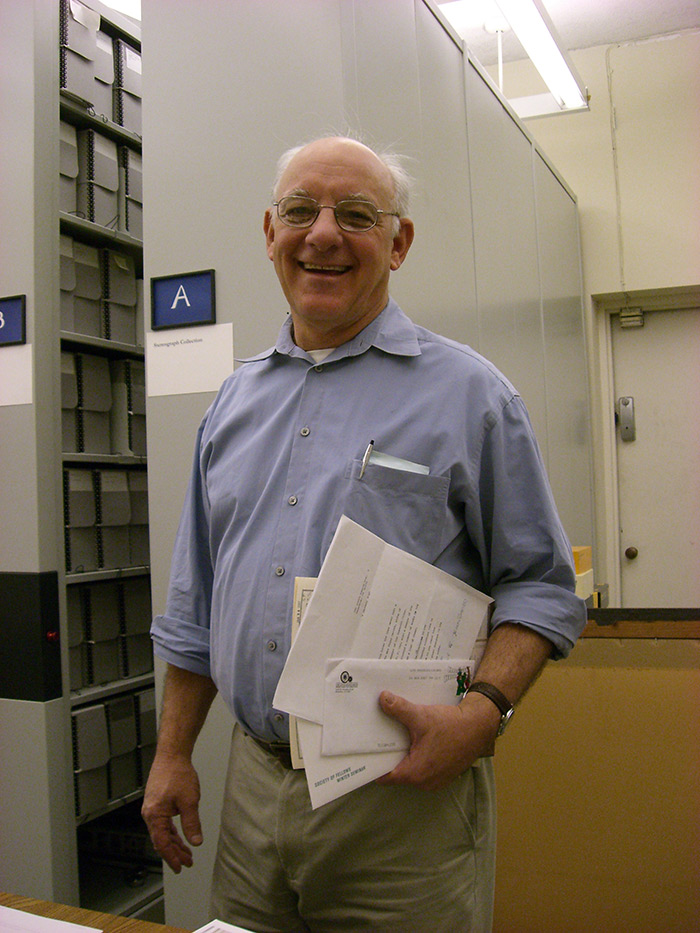
Alan Jutzi, Avery Chief Curator of Rare Books, on the job in 2007.
Today the Avery Chief Curator of Rare Books at The Huntington, Alan Jutzi, will kick up his office doorstop one last time and shut the door behind him after 45 years of dedicated service.
Those of us who have had the privilege of working with Alan for some part of those decades will be hard pressed to pass by his door without thinking of the unassuming man who dedicated a career to making sense of The Huntington’s vast Library collections. Half the time, there he’d be in his windowless office—filled with stacks of papers, piles of books, and scribbled notes drifting over every surface—leaning back in his chair, hands clasped behind his head, absorbed in animated conversation with this or that scholar or colleague.
The other half of the time, the door would be closed. Alan was out and about. He might be retrieving a collection, grappling with a conservation challenge, answering a query in the reading room, meeting a donor, or helping to untangle a cataloging conundrum.
As he looks back on nearly a half century of working at The Huntington, Alan says simply, “I’ve really enjoyed helping people.”
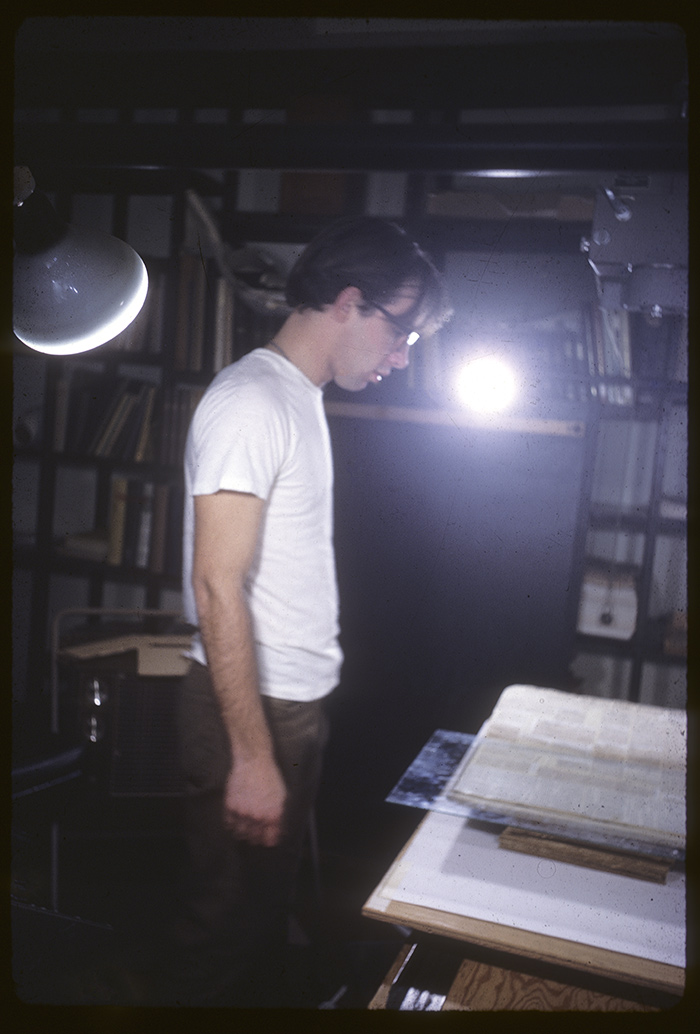
Alan Jutzi working in his first position at The Huntington, circa 1970.
The start of his career was typically Alan-esque—humble yet focused. He and a buddy came to California from the Midwest in 1969, pulling a U-Haul packed with their scant worldly possessions. And where many of his wandering generation found what they were looking for in less august settings or pursuits, the 20-something Alan was bound for a different California Dream. In 1970, when McDonald’s passed on hiring Alan, he took the local bus line all the way from Manhattan Beach to San Marino and filled out an employment application at The Huntington. The institution smartly gave him a job. His first position? Microfilm operator: point and shoot, turn the page, point and shoot, turn the page. Thus began one of the world’s great apprenticeships amid The Huntington’s treasures.
Alan rose rapidly through the ranks. Alongside earning an M.A. in Library Science at UCLA in 1974, he worked as an assistant curator of literary manuscripts. From there, it was on to assistant, then associate, curator of rare books, with an expansive job portfolio that included forays into the vast visual materials holdings: photography, historical prints, and ephemera. One might say that Alan has been a jack of all trades at The Huntington and has mastered each. By the early 1980s, he had become chief curator of rare books, overseeing millions of rare historical materials and an entire department of professional colleagues.
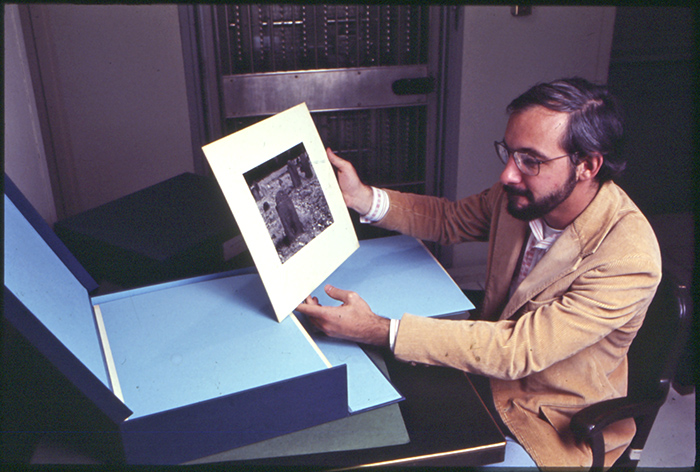
Alan Jutzi in the rare book stacks perusing a photograph by Edward Weston, circa 1980.
Alan stood on the shoulders of the distinguished curators and bibliophiles who preceded him. But he has made the position uniquely his own, especially in the brilliant ways that he has added to the collections. Collection development is this curator’s professional sweet spot, his thing. He furthered the Library’s long-standing commitment to such fields as colonial and revolutionary America, the Civil War, California and the West, the British Empire, and literary production on both sides of the Atlantic.
He went beyond the institution’s known strengths to establish fresh ones, and, in the process, often mounted innovative exhibitions to showcase materials he found—or which found him. Alan has been an “activist curator,” pushing the institution into new arenas, themes, and associations of insight and curiosity. He singlehandedly built the archives in architectural materials (which required a dumpster dive or two), regional medical history, cookbooks and food culture, and urban and regional planning. He played the keystone role in bringing in such remarkable book and manuscript collections as those related to William Morris, T.E. Lawrence, Charles Darwin, Sir Richard Burton, Francis Bacon, Jack London, Y.C. Hong—the list goes on and on and on.
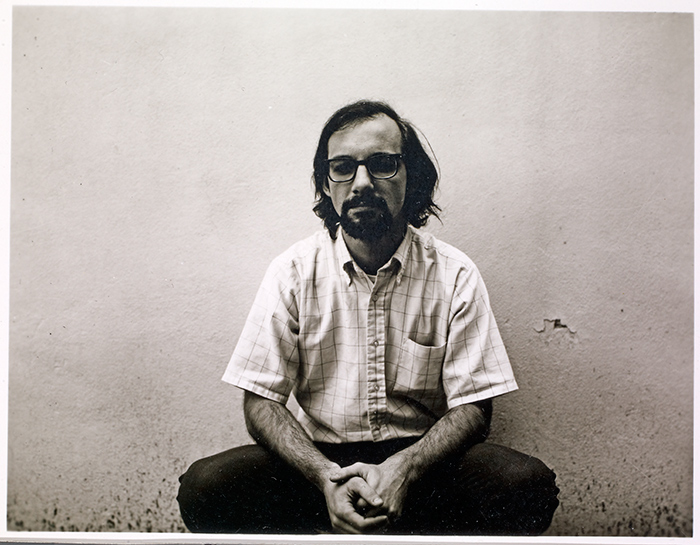
Alan Jutzi in 1973. Portrait by former Huntington colleague and professional photographer Gusmano Cesaretti.
That’s one legacy. Alan’s warmth and decency, his geniality to researchers at all levels—and from all walks of life—is another. Alan has helped legions of world-class scholars who come to The Huntington for a day or a year, and he has also done the same for the graduate student just starting out, the city planner in search of historical context, the regional preservationist trying to save a threatened building, the undergraduate doing her first major research paper, and the passionate seeker of information who just happens to be the world’s expert on X, Y, or Z. He has answered thousands of queries: some mundane, others obscure or intriguing. The effusive praise he’s received from hundreds of authors in their acknowledgment pages bears witness to his remarkable service.
His kindness has made him countless friends in every quarter of the The Huntington. Quiz just about anyone, and he or she can attest to the cheerfully distinctive jangle of loose change and keys. That’s Alan on the run, perhaps yet again tracking down the one perfect item for a last minute show-and-tell, or dashing off to an impromptu coffee or lunch. For years, Alan was the reliable fourth hand at regular noontime bridge games. And it was at The Huntington that Alan met Laurie, his wife of 38 years.
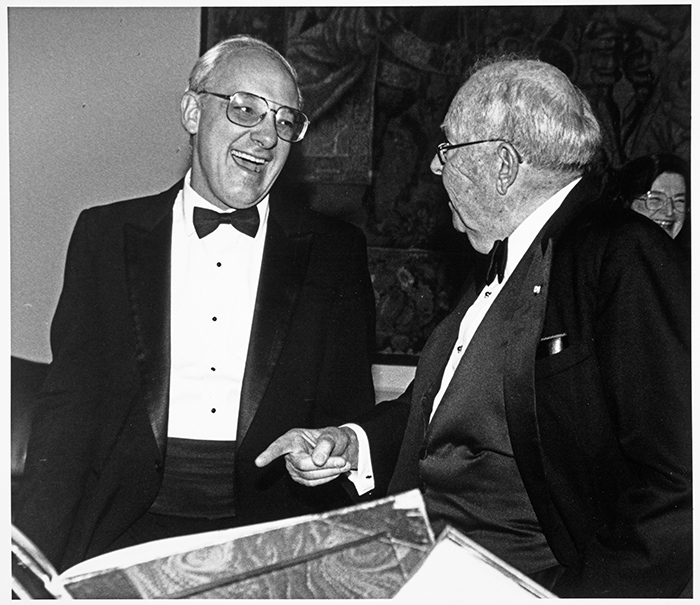
Alan at a Huntington black-tie event, circa 1990, in conversation with Franklin D. Murphy, former chancellor of UCLA and former chairman and CEO of the Times Mirror Company.
Alan made friends for The Huntington, too—his good cheer cutting through the sometimes remote façade of the place. So that his legacy may be made permanent, Alan’s friends and colleagues have created an endowed fellowship in his name. The Alan Jutzi Fellowship for Non-Traditional Scholars will provide at least two months of residential funding annually to someone chosen from outside the customary academic tracks that produce The Huntington’s readers. The creation of this new fellowship seemed the most fitting way to honor Alan’s abiding curiosity and egalitarian generosity over the past 45 years.
When Alan kicks up his doorstop one last time, allowing his office door to close, an era at this institution will come to a close as well. Alan’s career has been a glorious one, filled with passionate service and collection-building that have resulted in Alan’s becoming the keeper of institutional memory and—though he’s far too modest to admit it—the repository of the institution’s soul.
Thank you for everything, Alan. You are already missed.
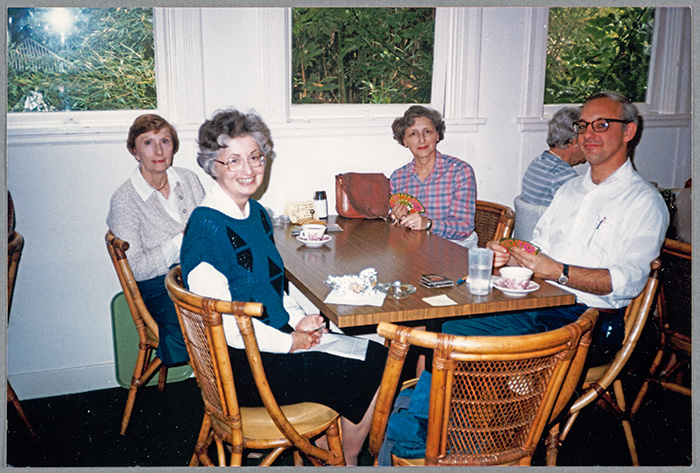
A bridge game among Huntington staff, 1986. Left to right: Debbie Smith, Harriet McCloone, Mary Foster, and Alan Jutzi.
You can watch a video about Alan Jutzi’s work as a curator on Vimeo.
If you wish to donate to the Alan Jutzi Fellowship, you may do so online or via mail to The Huntington’s Advancement Office at 1151 Oxford Road, San Marino, CA, 91108.
Jennifer A. Watts is curator of photography at The Huntington. Alan Jutzi hired her 25 years ago.
William Deverell is director of the Huntington-USC Institute on California and the West and a professor in the history department at USC. Deverell, Jutzi, and three other current and former Huntington readers go golfing together every summer in Jackson Hole, Wyoming.